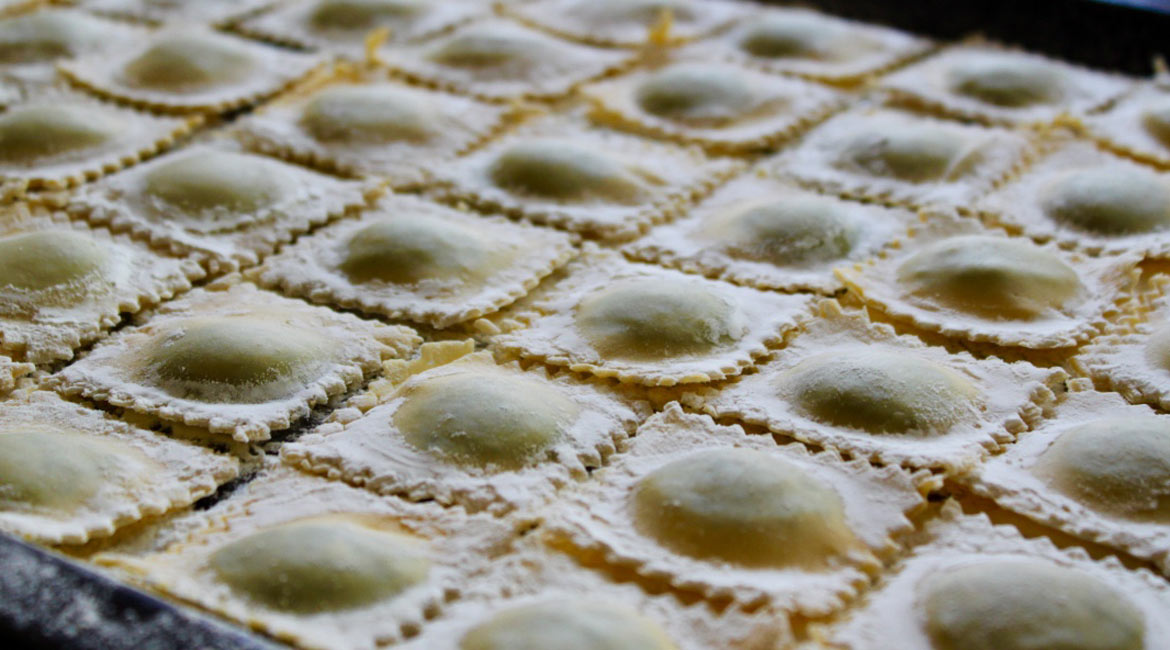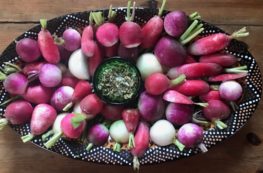The seed for this recipe was sown by Chris after he asked me when I was going to make ravioli using Mongongo nuts. Once again we’re laden with pounds and pounds of nuts, harvested from our house tree in June, shelled by Ruth Mongongo in her village on the Zambezi River, and safely stored away in our big freezer.
Mongongo nuts are soft and oily, not unlike pine nuts, slightly bitter like a Brazil nut, and filled with goodness. Traditionally, indigenous Zambians have harvested them for their oil. Ever since I learned the nuts were edible I’ve developed all sorts of recipes around them. Any excuse to use wild food and I’ll take it. In this instance, I chose to incorporate a Mongongo nut meal into a basil pesto with which to stuff the ravioli. (We are also laden with fresh basil right now.)
Having purchased 10 point-of-lay hens back in June — fulfilling a lifelong wish to have my own chickens — our busy ladies are now producing 10 eggs a day. 10 out of 10! The joy this gives me! The eggs are growing in size; the yolks becoming ever more yellow. There is no longer any excuse for us not to make fresh pasta.
Basil & Mongongo Nut Ravioli with Lemon-infused Beurre Noisette
Yield: 4-6 servings
Ingredients:
Ravioli stuffing
- 2 large handfuls basil leaves = 1 cup finely chopped basil
- 3 tablespoons Mongongo nut meal (any soft nut could be used as a substitute)
- 50 grams Parmesan cheese, grated = about 1 cup
- 25 grams Mozzarella cheese, grated = about 1/2 cup
- I garlic clove, smashed
- 1 egg, lightly beaten
Ravioli dough
- 400 grams/3 heaped cups household flour
- 4 eggs, lightly beaten
Lemon-infused Beurre Noisette
- 150 grams/5.29 ounces butter
- 3/4 cup Mongongo nuts, dry-roasted and roughly chopped (any soft nut could be used as a substitute)
- Small handful fresh basil, dill and mint, finely chopped
- Fresh lemon juice to taste (I used just over 1 tablespoon)
Method:
- Mix together the basil, Mongongo nut meal, cheeses and garlic, and bind together with the egg. Set aside.
- Sieve the flour into a large mixing bowl, and make a hole in which to pour the beaten eggs. Combine with a wooden spoon until the mixture starts sticking together and turning into a crumbly dough.
- Turn the dough out onto a flat surface and knead until it is well bound and changes color, about 15 minutes. (You will ‘feel’ the dough change as you knead; it starts to sweat as it becomes softer and more malleable.) Cover the ball of dough with a damp tea towel so it doesn’t dry out during the process of rolling the ravioli sheets.
- Clean the pasta maker by running a small piece of dough through the rollers 3-4 times. Discard the dough.
- Break off a handful of pasta dough and run it through the pasta maker at its thickest setting about 3-4 times. When the pasta sheet feels smooth and sturdy to the touch, run it through each subsequent setting until it’s at its thinnest.
- Carefully place one end of the pasta sheet over the ravioli tray, folding the rest under a damp tea towel until ready to use.
- Carefully teaspoon the basil and Mongongo nut pesto into each ravioli square, and then cover with the rest of the pasta sheet. (If you have leftover dough, use it for the next tray of ravioli squares.)
- Press down gently on the ravioli squares with a rolling pin to seal them. Remove the excess dough from the sides of the tray, and then transfer each ravioli square to a floured baking tray.
- Repeat these steps until all the dough and filling have been used up.
- Refrigerate or freeze the ravioli until ready to use (I aways freeze mine overnight).
- Bring a pot of salted water to a roiling boil. Carefully spoon in the ravioli squares and cook, about 4-5 minutes.
- While the ravioli is cooking, melt the butter in a small saucepan. When the butter starts to froth and turn brown, remove from the heat immediately. (Watch it carefully because butter can burn every easily.) Stir the Mongongo nuts, fresh herbs, and lemon juice into the brown butter, or beurre noisette.
- Lay out the ravioli neatly on a plate, spoon over the lemon-infused beurre noisette, sprinkle with grated parmesan, and serve immediately.


















22 Comments
Thanks Annabel… It is always such a pleasure to get your blogs. They are so inspiring. Monique
Thank you so much for your kind comment, Monique. I really do appreciate your support and interest. All the best to you … Annabel
Sounds heavenly and great to know there is an alternative to pine nuts for pesto (Pine nuts are such a price !!!)
Thank you, chitaitai … yes, they make a great alternative to pine nuts. We can seldom buy pine nuts here at all!
Yummy! I wish I was coming for supper. xxx
I wish you were coming for dinner, too, Kate! Wouldn’t that be a treat? Lots of love … xo
I don’t have any mongongo trees here, but I’m drooling over your ravioli tin. Did you find it in Zambia? I can get a friend to get me one if you did. No such luxuries where we are. x
Hello Dal … the ravioli tray was a gift to Chris many years ago. I don’t think it came from Zambia. I’ve never seen them in the shops here. I suggest you go on-line. There is a huge selection of ravioli trays to buy. Thanks for stopping by my blog! All the best to you, Annabel
Ta. I’ll give it a try
Oh yummy! Have you seen these nuts on sale in zim, and if so what’s their Shona name?
Thanks for your interest, as always, Shaunagh. A Mongongo tree in Zimbabwe is referred to as a Manketi tree (common name). They grow on Kalahari sand so will probably only be found in the Zambezi Valley/ Vic Falls area. That said, it would be worth asking around, maybe in the Harare markets. Good luck!
Gorgeous photos! I am so fascinated by your Mongongo nuts. And isn’t it fun having chickens? We’ve had lots and lots at times (don’t try making money from it … it doesn’t work). Now we’re down to just two. But they’re such fun creatures and the eggs can’t be beat.
Thank you so much, Michelle. Ah yes, the joy of chickens! I’m in love with all 10 of them … and, as you say, there is little that beats a good fresh egg. We are indeed fortunate to live under a Mongongo tree, although when I first arrived on the farm not many people I met had ever eaten the nuts. I’m trying to remember if there are any native nuts in your neck of the woods, or Virginia for that matter?
Looks so delicious! Love all the eggs!
Thanks, Georgie … me too! 🙂
How wonderful to be so well supplied with nuts, eggs and basil! And what a delicious way to use them. Maybe I can adapt this for walnuts if the squirrels leave us any on the tree in autumn.
Great idea, Anne! I’ve found walnuts go really well with rocket, or any of the spicier greens. I’ll keep an eye out on your blog!
Your ravioli looks absolutely scrumptious with your pesto. Would love to try a Mongongo nut. How big are they? Do they have a shell? I often use walnuts in place of pine nuts which are very pricey.
Thank you for your kind comment, Gillian. The nut itself is about the same size as a hazelnut, although it’s much softer and oilier. The shell is extremely difficult to remove, and I have to call on the assistance of women in villages nearby to help me open them. Certain Tonga families have been opening the nuts for generations, and then passing the (dangerous) skill down from mother to daughter. You can find out more here: https://savannabel.com/2014/07/11/mongongo-nuts-elephants-bush-biscotti/. All the best to you, Annabel
These are stunning ravioli! But I so wish I could taste some mongongo nuts!!!
Haha, Chef Mimi … well, guess where you’ll have to visit sometime! Thanks so much for your kind comment. All the best to you, Annabel
[…] Mongongo Nut, Basil & Nasturtium Leaf Ravioli with Lime-Infused Beurre Noisette […]
Comments are closed.